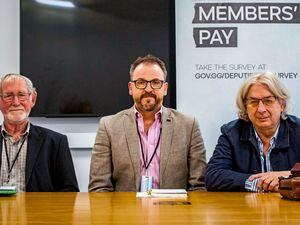Unhealthy balance
THE Medical Officer of Health is quite right about the stark health inequalities between rich and poor in Guernsey. As Dr Stephen Bridgman points out, poorer islanders face a double whammy.
THE Medical Officer of Health is quite right about the stark health inequalities between rich and poor in Guernsey. As Dr Stephen Bridgman points out, poorer islanders face a double whammy.
Firstly, with less cash to spend on good food, heating and housing, they're more likely to become ill. And when they do, it's harder to afford healthcare.
Dr Bridgman should be applauded for having the gumption to highlight the issue. It's an example of why it's so important that the MOH remains ungagged and free to criticise the States.
The huge question is how this health inequality can be effectively addressed at a time of financial constraint.
The best way would be to eliminate poverty. The States resolved to tackle that task as a priority a decade back. They started well, with big increases in single pensions and a few other targeted measures. Alas, the momentum faltered as zero-10 was brought in and the focus swapped to making up the huge deficit it created. If anything, current States policies are more likely to enhance the gap between rich and poor than reduce it.
Maybe it's worth learning lessons from the Scandinavian countries, with their very low levels of relative poverty. True, their taxation regimes would cripple our economy, but speak to Scandinavians and they will tell you that there's one measure above all others which is vital in liberating families from cyclical poverty – and that's affordable childcare, allowing mothers full access to the workplace.
If Guernsey could achieve that alone, it would be a huge step forward, benefiting not only low-income families but the whole economy.
Turning to healthcare costs. As long as there is a charge for care at the point of delivery, it's bound to create problems for the less-well-off.
To be fair though, it's not as bad as it used to be. Healthcare can be roughly broken down into three categories – primary, specialist and long-term.
I remember when you had to pay for all three. This caused huge problems, with big bills for operations and older people unable to afford nursing homes. That situation has improved a lot.
Firstly, the States brought in the specialist-care insurance scheme. It wasn't universally popular, though, with American-style 'My Health – My Choice' stickers appearing on cars.
But a compulsory scheme was the only way to provide affordable insurance against the high cost of specialist treatment, particularly for those with pre-existing conditions.
Then came the long-term-care insurance scheme, which was strongly opposed by A and F. I doubt it could have been delivered with our current model of government but, rightly, the old Insurance Authority and Board of Health forced it through the States. That meant islanders no longer needed to fear the cost of residential or nursing-home care.
That just leaves primary care – and it certainly is a big issue. Not only because of the financial grief which doctors' bills can cause – no coal this week because I've been to the GP. Just as importantly, when islanders put off seeing the doctor because of the cost, it can mean they're much sicker by the time they eventually do go.
Finding the right answer in the current climate won't be easy. Certainly, any attempt to create a revenue-neutral solution will be hugely unpopular with those who lose out. I know this to my cost.
Some years ago, the school dental service reported a real problem with the dental health of children from poorer backgrounds. HSSD looked to respond without breaking its already-stressed budget.
There was no reduction in the number of dentists or nurses but their work was redirected. Statistics showed the 50% of island children who used the school dentists were generally those in least clinical or financial need. So we removed open access and focused the work of the service on those who needed it most.
Understandably, that caused outrage among those who were having a free service removed. I don't blame them. But I'm proud of my board for having the courage to stick by their guns and help those children in most need.
It may well be that similar radicalism is needed to make access to GPs affordable for all.
The £12 co-payment increased but means-tested? More competition encouraged in primary care? Maybe even a States-owned GP practice?
Better still, tackle the poverty that makes health care unaffordable.
It's a mighty big and difficult issue, but the MOH is right to raise it.





